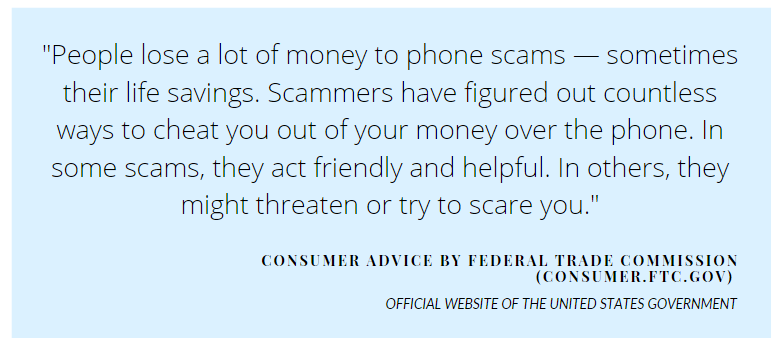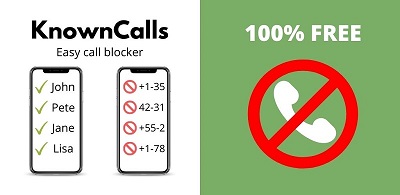Calling about your car’s extended warranty:
How to protect yourself from phone call fraud and scam
Telephone is a great invention that helps connect people. But the virtues of the ever-present phone connection are spoiled by some downsides.
Lately, phone calls have become a source of danger. Who hasn’t received those spam calls over the latest decades, either offering a very profitable insurance plan for your car, or congratulating you on having won a lottery with a big prize? Scam artists – the fraudsters who perform phone call scams – might get very creative with how they disorient the victim, using tactics of pressure, fear, urgency, raised voice. Some scammers may call with threats of jail or lawsuits, of grave repercussions that may arise from you not doing what they need you to. swindlers invent new ways everyday to take advantage of people, trying to get them to share personal information – bank account data, social security number, name, birth date, etc.

In its article ‘Common Scams and Frauds’, the official website of the United States government, USAGov.com divides phone call scam into 2 categories: financial scams and identity theft scams.
Financial phonecall scam schemes target robbing a person out of their money either by having a transfer to a fraudulent recipient, or by getting bank account information that would allow to take control over the victim’s account.
Here are some examples of how they work:

Scam calls are often a distraction from something important
|
![]() Lottery and prize scams is when the caller informs you that you have won a fake lottery, sweepstake, or other contest, and to collect your prize, you must pay a fee.
Lottery and prize scams is when the caller informs you that you have won a fake lottery, sweepstake, or other contest, and to collect your prize, you must pay a fee.
![]() Banking scams is when scam artists pretend to call from your bank and inform you that your bank account and/or money are in danger so they need your assistance in protecting it. During the talk, they try to convince you to tell them confidential bank account information, or to let them access your computer with remote access tools, and if you do, they steal your money. The scheme works so surprisingly ‘effective’ that it has become an international problem. The secret is the mixture of official bureaucratic language that confuses people, the imposed sense of urgency, and fear. Some come prepared and have some of your personal data at hand which makes the victim trust the caller thinking that this must be an official.
Banking scams is when scam artists pretend to call from your bank and inform you that your bank account and/or money are in danger so they need your assistance in protecting it. During the talk, they try to convince you to tell them confidential bank account information, or to let them access your computer with remote access tools, and if you do, they steal your money. The scheme works so surprisingly ‘effective’ that it has become an international problem. The secret is the mixture of official bureaucratic language that confuses people, the imposed sense of urgency, and fear. Some come prepared and have some of your personal data at hand which makes the victim trust the caller thinking that this must be an official.
The phone scams with callers pretending to be someone you could trust or care about is generalized under the name of ‘impostor scam’.
![]() Extended car warranties is where charlatans call to persuade you to buy overpriced — or worthless — service contracts. It is remarkable that they frequently have the information about what kind of car you drive and when you bought it at their disposal.
Extended car warranties is where charlatans call to persuade you to buy overpriced — or worthless — service contracts. It is remarkable that they frequently have the information about what kind of car you drive and when you bought it at their disposal.
![]() Investment scams is where you get a call from someone who pretends to be a financial expert and guarantees big profits from an investment. promises high returns of your investments without financial risk. Investment scams include various money pyramid schemes as well, but usually are just a way to get you to transfer money to their account, or get access to sensitive bank information that will grant them control over your money.
Investment scams is where you get a call from someone who pretends to be a financial expert and guarantees big profits from an investment. promises high returns of your investments without financial risk. Investment scams include various money pyramid schemes as well, but usually are just a way to get you to transfer money to their account, or get access to sensitive bank information that will grant them control over your money.
Other ‘dishonorable’ mentions in the list are:
![]() Charity scam artists convince the victim to be from real or fake charities so when they make a donation for disaster relief efforts, the money get to the criminals accounts instead.
Charity scam artists convince the victim to be from real or fake charities so when they make a donation for disaster relief efforts, the money get to the criminals accounts instead.
![]() ‘I’m in trouble’ impostor-type scam is where the caller pretends to be someone you know, or to call for account of them, and tell you that they are in trouble and need money right now, and promise details later. Depending on how fortunate the scammers are, they can hit pretty close to heart of someone who doesn’t have a regular contact yet are in a close relationship, so they are very convincing in swindling the money out of caring seniors.
‘I’m in trouble’ impostor-type scam is where the caller pretends to be someone you know, or to call for account of them, and tell you that they are in trouble and need money right now, and promise details later. Depending on how fortunate the scammers are, they can hit pretty close to heart of someone who doesn’t have a regular contact yet are in a close relationship, so they are very convincing in swindling the money out of caring seniors.
To help themselves perform better, scammers exploit methods that substitute Caller IDs so the call might seem to be coming from a contact you know, while in reality it’s not.

Protection of elderly from scam calls
|
Identity theft scams are mainly represented by census scams (when someone pretends to work for the Census Bureau to steal your personal information) and lottery scam (require you to provide personal information to enter a “contest.”). As said before, scammers are quite inventive so they fit new strategies to new world events: during the coronavirus outbreak, phone call scammers would reach out to people and pose as Medicare or another government agency representatives to get personal data. Even more dishonorable than that, some fraudsters have no scruples in scamming families members of people who have died from COVID-19, or those who await a governmental stimulus check.
Scammers do their homework well: they change their numbers as well as their methods frequently, polishing their script with new comebacks to questions and objections the latest victims might have asked. This is how they make their living, and we must admit, it’s been a profitable path.
Usually, scam calls are actually made from foreign countries with no extradition policies. Besides, with the technological advances of the world we live in, scammers possess over a number of anti-tracking equipment and use illegal VoIP services so the number they are calling from is not real.
So how do you protect yourself, your money and your identity from phone call fraud and scam? There are 3 core strategies that could come to your help:
1. Pick up but be on your guard.
This is the simplest strategy, although probably not the most effective. Basically, what you do is continue to live your regular life and do what you always do, but when picking up calls from unknown numbers you bear in mind that someone might try to scam you, and just use common sense to establish if the call is a fraud. The obvious downside of this strategy is that you will keep getting several spam calls a day, sometimes even at night, and if the caller is a scammer you give them a chance to catch you in their net. Remember that scammers have years of practice and are very convincing. Beside the waste of time and nerves on these annoying unneeded calls, this method doesn’t work that well if you want to protect others – family members, kids or seniors who can fall victim to apt fraudsters. Even if you are confident in yourself, you can’t rest assured that swindlers won’t get to your close ones.
2. Do not pick up calls from unknown numbers.
The next method is very similar to method #1: do not pick up any calls that come from unknown numbers. You will continue to receive annoying calls, distracting you when you are busy, sleeping, driving, working, making videos with your phone or talking to those who are really important. But at least you will not waste time answering such calls, and you will not give the scammers a chance to play tricks on you. In some aspects this strategy is even worse than strategy #1: realizing that the number is valid but not responding at the time, scammers will try to “break through” to you again and again. Another disadvantageous “side effect” of this strategy is that if you do not pick up any calls from unknown numbers, you can miss an important call, for example in situations when you are waiting for a call from a delivery service, a buyer interested by your online ad, or an HR of a good employer. Also, the downside that you can’t protect your loved ones with this method remains – there is no guarantee that they won’t pick up that one call that will rob them. So what can you do if your are really tired of spam calls AND want to get rid of unwanted calls forever?

Don’t let scam calls ruin the moment
|
3. Use spam catchers (blockers of calls from unknown numbers)
A modern way to get rid of annoying calls from spammers and scammers is to use various smart call blocking utensils. There are several subtypes of call blockers that naturally differ in their effectiveness and implementations.
a) Mobile operator call blocking services. You can set up call filtering at the level of a phone service provider (a mobile operator), many of which provide Antispam service, most often for an additional monthly fee. The quality of such filtering varies from operator to operator, but generally it works like this: a call comes to your phone marked “Probably spam”. In this regard, this method is an improved version of anti-spam strategy #2: you get some information about the caller to make a decision whether to pick up the phone or not. Usually, a mobile operator needs time to gather statistics about a call number to determine whether it belongs to a fraudster, so when a scammer gets a new number, they might still get through to you.
b) Call filtering at the level of the phone’s operating system. Many phone manufacturers are aware of the problem with unceasing spam and scam calls so they produce smart phones with the build-in ways to counter them. For example, modern iPhone devices can boast a valid built-in function for blocking calls from all unfamiliar numbers. Android device owners are a little less fortunate: this feature was available in older versions of the OS, but, unfortunately, is not available in modern versions. In addition, Android devices come with a custom shell from the manufacturer (for example, Xiaomi’s MIUI), that might make certain functions like call filtering unavailable. Luckily, there is a solution for owners of Android as well!
 c) Special call blocker apps. Perhaps the best way to protect yourself and loved ones from spam and scan on Android devices is specialized applications for blocking unwanted calls and text messages (SMS). There are many paid apps with such functionality, but there are free ones as well, some of them sponsored by ads but some are completely free. For example, there is a new, 100% free application called KnownCalls recently released. Its functioning is as simple as it gets: it can automatically reject incoming calls that come from numbers not in your Contacts or Favorites. Besides, KnownCalls works with text messages as well: spam and scam SMS from unknown numbers can be muted so that they do not disturb you. The beauty of this app is that it respects your privacy: no data about your calls is collected or shared at any time. KnownCalls works without Internet access so it works anywhere, and is perfect for protection of seniors or children if their device is on no Internet plan. The developer of KnownCalls is the renowned FelenaSoft company, a software developer with over 18 years experience, the maker of Xeoma video surveillance software sold in 134 countries of the world. Addressing the question of why the app is free, a FelenaSoft representative said: “We made the application for ourselves, but decided to share it with you.” You can read more about this wonderful free call blocker app here.
c) Special call blocker apps. Perhaps the best way to protect yourself and loved ones from spam and scan on Android devices is specialized applications for blocking unwanted calls and text messages (SMS). There are many paid apps with such functionality, but there are free ones as well, some of them sponsored by ads but some are completely free. For example, there is a new, 100% free application called KnownCalls recently released. Its functioning is as simple as it gets: it can automatically reject incoming calls that come from numbers not in your Contacts or Favorites. Besides, KnownCalls works with text messages as well: spam and scam SMS from unknown numbers can be muted so that they do not disturb you. The beauty of this app is that it respects your privacy: no data about your calls is collected or shared at any time. KnownCalls works without Internet access so it works anywhere, and is perfect for protection of seniors or children if their device is on no Internet plan. The developer of KnownCalls is the renowned FelenaSoft company, a software developer with over 18 years experience, the maker of Xeoma video surveillance software sold in 134 countries of the world. Addressing the question of why the app is free, a FelenaSoft representative said: “We made the application for ourselves, but decided to share it with you.” You can read more about this wonderful free call blocker app here.
As you can see, the life free of spam and scam calls is possible. So if you often receive calls from unknown numbers, you can rely on your own vigilance – or spend half an hour researching the vital issue of your security to find what fits your case the most. Peace of mind and scam-free life is in your hands, so see if the described strategies will help you discover a new level of security.
August 18, 2022
Read also:
Best Android call blocker app against spam calls in 2022
Block unwanted phone calls on your kid’s phone